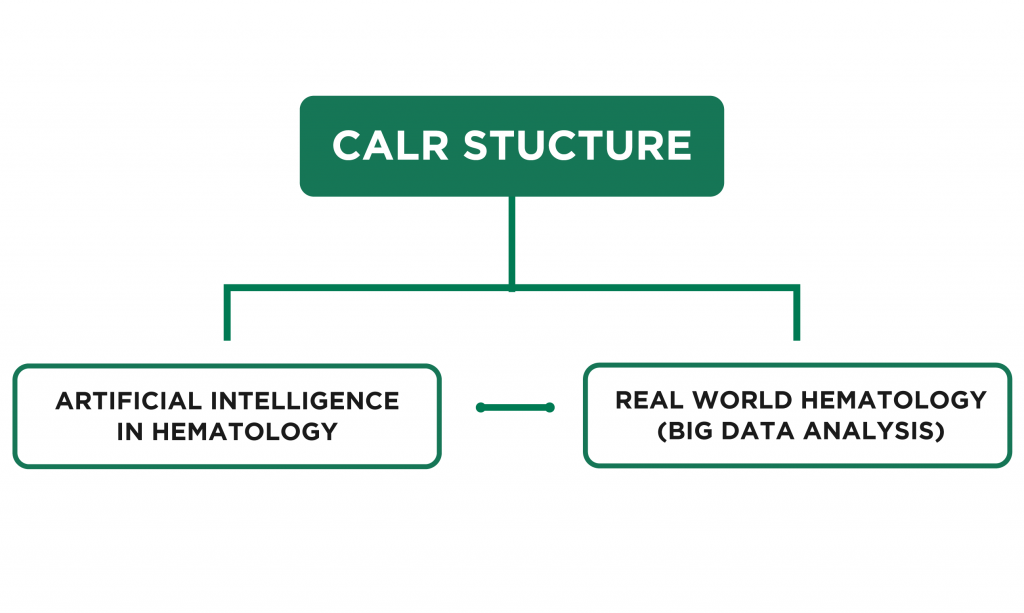CALR: Center for Accelerating Leukemia/Lymphoma Research
Improving human health by using artificial intelligence and big data analysis to advance our understanding of the biology and treatment of hematological malignancies, and to help lay the groundwork for the generation of personalized hematology programs.
CALR is defined to seize the opportunity that arose from the Human Genome Project – the international effort that successfully deciphered the entire human genetic code – and from new technologies applied to life sciences – such as big data analysis and artificial intelligence (AI)
Despite that accomplishment, hematologists knew they still lacked a clear understanding of the genetic basis of leukemias and lymphomas, and how to translate that understanding into more effective prevention, diagnosis, and treatment.
To reach these goals, it is clear that a new type of hematological research network had to be created. The traditional academic model of individual laboratories working within their specific disciplines was not designed to meet the emerging challenges of biomedicine. To gain a comprehensive view of the human genome and biological systems, they instead had to work in a highly integrated fashion.
That meant working in nimble teams that combined biology, genomics, mathematics, computation, artificial intelligence and engineering with medical science and clinical research. It also meant working at a scale usually seen in industry, with access to world-class infrastructure.
CALR and Artificial Intelligence
CALR aims to advance the use of artificial intelligence (AI) in hematology.
CALR will focus on developing innovative clinical applications of AI and leveraging machine-learning technology in hopes of improving hematological healthcare delivery in areas such as diagnostics, disease prediction and treatment planning
The center aims to foster collaboration and communication between physicians, researchers and data-scientists; offer programmatic and technology support for AI initiatives and conduct research in hematological malignancies.
Researchers will build machine-learning models for several projects using AI technologies in diagnostics, prognosis, treatment decision-making, and patient outcomes.
CALR and Real World Hematology
Real world evidence (RWE, that is, scientific evidence derived from the clinical ‘footprints’ of real patients as they access their routine medical care) is the new-paradigm of value-based healthcare, as a basis for the clinical implementation of personalized medicine programs. Real-world evidence can provide answers on burden of disease, healthcare utilization (in terms of appropriateness with respect to evidence-based guidelines), post-marketing drugs’ safety and comparative effectiveness and cost-effectiveness profiles of drug therapies and healthcare pathways.
Research Areas of Interest
- Healthcare Technology Solutions
- Extending database technology
- Omics data analysis (bioinformatics)
- Machine Learning for Health Analytics.
- Neural networks
At the same time, CALR had to foster an atmosphere of creativity, risk-taking, and open sharing of data and research.
In this view, CALR is an “experiment” to connect leading research institutions in Milano (Humanitas Research hospital, Humanitas University and Politecnico di Milano).
The idea is to define a scientific community committed to advancing research in hematology.
Our goals
- Driving the understanding and treatment of hematological malignancies
- Collaborating deeply
- Empowering scientists
- Building partnerships
- Sharing data and knowledge
- Promoting education and training
Innovative educational and training opportunities
CALR represents in addition a comprehensive answer to a cultural challenge focused on the recent advances and success of the bio-medical research area and on the resulting modern technological applications. The post-genomic era is leading to a revolution in the understanding of human diseases and in the designing of the related therapies. However, the possibility of elucidating cellular and molecular mechanisms that regulate complex diseases such as leukemias and lymphomas needs a deeply interaction between basic and applied research. This requires the formation of “translational” professional profiles with a robust background in basic research and data analysis, equipped to bridge the gap between bench and clinical investigation. Such skills are crucial in orienting research to efficiently meet current diagnostic and therapeutic need in hematology.
CALR Team
Members
Direttore Cancer Center e Responsabile Unità Operativa Oncologia medica ed Ematologia
Capo Sezione Linfomi e mieloma

